- Home
- Graham Hancock
War God: Nights of the Witch Page 26
War God: Nights of the Witch Read online
Page 26
The governor cupped his hands to his mouth and shouted something, but the words were snatched away on the wind.
‘Get us closer,’ Cortés ordered Guiterrez.
‘Closer, sir? I’m not sure that’s wise.’
Cortés’s face was set. ‘Closer, please.’
Guiterrez heaved at the oars again, thrusting the skiff through the waves, the pier loomed ever higher above them and suddenly they could hear the governor. ‘Why is it, Don Hernán, that you sail in such haste?’ he bellowed. ‘Are we not friends? Are we not business partners? Is this a courteous way for you to take your leave of me?’
Cortés stood up in the lurching boat, his feet spread wide, somehow keeping his balance, and made an elaborate bow: ‘Forgive me, Don Diego, but time presses and this was something that needed to be done rather than talked about. Has Your Excellency any final commands?’
‘Yes, you wretch,’ Velázquez shouted. ‘I command you to accept my authority and return to shore where I’ll give you the hanging you deserve.’
‘My deepest regrets, Excellency,’ Cortés said with another mocking bow, ‘but that is something I can never accept. This expedition sails on the authority of God and of His Majesty the King alone to conquer new lands and bring wealth and honour to Spain. I cannot permit such high purposes to be subordinated to the whims of a mere provincial governor.’
‘Then accept this,’ Velázquez spluttered, and two men, previously unseen, suddenly stepped through the ranks of his guard and raised long devices to their shoulders in the manner of crossbows – devices in which smouldering embers seemed to be embedded. Pepillo had never seen crossbows such as these, but he felt sure they would harm Cortés, so without further thought he propelled himself forward, wrapped his arms round his master’s knees and knocked him down into the bottom of the boat. Simultanously he heard two loud reports, projectiles whizzed and whined through the air just above his head, and Guiterrez began to row like a madman back towards the Santa María. The wind was with them now and they moved much faster than they had before.
‘Forgive me, master,’ Pepillo heard himself yelling. He felt sure he had made some terrible mistake. His career as the caudillo’s secretary was over before it had begun.
Cortés struggled upright and peered back over the side of the skiff at the rapidly receding pier. Then he started to laugh. ‘Forgive you, lad?’ he said. ‘I was having such fun baiting Velázquez, I didn’t see the muskets. I think you’ve just saved my life!’
Ten minutes later, the Santa María was under way, every sail bending before the wind.
The signal lights of the rest of the fleet were visible far ahead of them, shining like shooting stars, proceeding through the narrow, mile-long inlet that connected Santiago harbour to the open ocean.
The weather had turned truly foul and, despite the shelter afforded by the inlet, huge waves rolled under the ship, sending it caroming and tumbling from crest to trough. Alaminos and Cortés both had their hands on the whipstaff, which jumped and quivered as the racing seas shook the rudder.
Pepillo heard banging and crashing sounds coming from the stateroom, where he found Melchior at work by lamplight, demolishing the partition with a sledgehammer, delivering every blow with grim, focussed attention. A huge splintered gap was now open between what had formerly been the cabins of Cortés and Muñoz, and since Melchior had coldly refused his help, Pepillo walked through, lit a lantern and began to collect up various items of Muñoz’s property that the Dominican had set out on the bed and the table. On the latter he found parchment, a quill and an inkwell and, remembering his instructions, sat down to write out the words that had passed between Cortés and Velázquez at the pier.
The keening of the wind in the rigging, the crack and whip of the sails, the alarming groaning of the timbers, the concussion of the waves and the increasingly tumultuous rearing and plunging of the ship made the task burdensome, and Pepillo realised he was beginning to feel quite sick. Still he persevered. He had just reached the point where the caudillo said that the expedition had sailed on the authority of God and the king of Spain alone when the Santa María heaved over violently to starboard and took on a great mass of seawater that foamed and boiled thigh-deep across the floor of the stateroom. Helpless to resist, Pepillo was dragged from his chair by the flood and sluiced towards the open door.
Chapter Forty-Four
Small hours to full morning, Friday 19 February 1519
Shikotenka judged his squad’s losses to be light. Only cousin Tochtli and three others had died in the raid and nine more were injured, none too seriously to disrupt the next phase of the plan. Alarms were being raised everywhere and the vast Mexica camp seethed with noise and anger, drums beating, conches blaring, warriors boiling forth from every quarter, responding to the threat with all the instinctive fury and blind aggression of a disturbed ant colony.
The Tlascalans streamed out of the pavilion’s south portico to confront a baying mob, already many hundreds strong, illumined by the flickering glare of firebrands and armed with spears, macuahuitls, daggers and clubs, the vanguard less than fifty paces away. Shikotenka had expected worse. The Mexica were advancing, shrieking their rage, milling across the great southern avenue, spreading out to left and right into the makeshift city of tents on either side, but they were poorly coordinated, not yet in military order, still barely able to believe that a strike had been made against their leader.
The bad news was that the rain which had concealed the Tlascalans’ approach had stopped as quickly as it had begun, giving way to a soft drizzle, and now they had to run a gauntlet of two thousand paces back to the camp’s southern gateway before they could seek the refuge of the hills.
The good news was that the Mexica were in a state of obvious disorder and confusion, with huge groups of men visible in the shadows running in a dozen wrong directions, not towards the pavilion but away from it! Off to the southeast a great glow of torchlight showed the distraction created by Guatemoc was still working its magic.
Detailing Tree, Chipahua and three of the biggest, most hardbitten foot soldiers in the squad to form the head of the Tlascalan battering ram, Shikotenka placed himself in the second rank alongside Acolmiztli, Etzli and Ilhuicamina, with the rest of the men in eight ranks behind. As the whistling and hooting mob surged towards them he gave the signal, and the tight, disciplined phalanx charged as a single, deadly unit, the ground trembling beneath their feet.
Arrayed close and deep, shields interlocking, bristling with spears and macuahuitls, they hit the chaotic mass of the enemy at a dead run, crashing into them where they were most numerous and ploughing brutally through them. Right in front of him, Shikotenka heard Tree roar and saw the muscles of his enormous shoulders ripple and flex as he thrust his heavy shield into screaming faces, spraying blood, demolishing warriors as though they were of no more substance than baked clay, crushing heads with hammer blows from his great club. By his side Chipahua laughed cruelly, swinging his shield in a scything arc, sweeping three Mexica novices off their feet and trampling them in the remorseless momentum of the onslaught, while Shikotenka and the other platoon commanders, all armed with spears, used the longer reach of their weapons to kill and maim and spread the contagion of dismay three and four ranks deep in the disordered rabble pressing round them. The technique here was the high overhand jab, into an eye, into a throat, into a belly, jerking the blade loose again as soon as the blow was delivered so the spear was not snatched away. Shikotenka saw with approval how the same tactic was being used by the men in the inner ranks, all along the length of the phalanx, while the outer ranks with their shields, clubs and macuahuitls battered aside the waves of attackers attempting to close with them.
Still they were hard-pressed, fighting for their lives, but Tlascalan training and discipline and sheer bloody resolve were second to none, and soon the squad had broken through the press, outpaced the pursuit and was left free to run for a hundred count with no more encumbrance than a
few wild, uncoordinated attacks by small groups of warriors and desultory arrows and atlatl darts that were easily deflected by their shields.
‘These Mexica aren’t what they once were,’ scoffed Chipahua as he struck down a single jaguar knight who ran yelling at him out of the darkness.
‘Like doing battle with babes,’ Acolmiztli agreed.
And Shikotenka thought, We’re going to get away with it, his heart exultant despite the sad loss of Tochtli, daring to hope now that he might extract his squad from the midst of this badly led rabble without further casualties. Where the Mexica should have thrown thousands of men across their path, only handfuls continued to challenge them, and the howling throng they’d broken through outside the pavilion was far behind them now.
The distance left to run to the foot of the hills had been cut to just five hundred paces before the second wave of Mexica warriors came in, a whole company of Cuahchics this time. They had the muddled look of men roused suddenly from their sleeping mats, and many were unarmed, yet they threw themselves at the Tlascalans with suicidal ferocity, slowing them while others hastily snatched up weapons and joined the attack.
The fight quickly became vicious. A giant of a Cuahchic, whirling a huge war club, smashed Chipahua’s shield to splinters and dealt him a hard blow full in the mouth that shattered his front teeth and mashed his lips to bloody pulp. Chipahua just gave an ugly laugh and hacked the man down with a great slash of his macuahuitl, charging on over his fallen body and killing a second attacker on the upswing. Tree seemed invulnerable, yelling defiance and laying about left and right with his own blood-spattered club, using his shield to batter through a wall of Cuahchics, opening the way for the rest of the squad to follow.
Again escape seemed within their grasp, the hillside beckoning, but as the phalanx rushed on, Shikotenka was tackled by four wild-eyed young warriors, grimly determined to capture him for sacrifice, and Etzli died screaming, impaled on a stabbing spear as he came to the rescue. Now more Cuahchics saw the prize, drawn to him like flies to meat, and Acolmiztli and Ilhuicamina piled in, not just out of loyalty, Shikotenka realised, but because they knew his survival was essential. As battle-king of Tlascala, the plan required that he must not only leave the field alive but be seen to leave it alive; for him to be taken prisoner would be the worst of all possible outcomes. He’d lost his spear and his shield, and his macuahuitl was still in its scabbard over his back, but he squirmed like an eel, the sweat and blood covering his body making him slick, and twisted his right arm free from the brawny fanatic who clung to it. He stabbed him once between the ribs with the dagger drawn from the scabbard at his waist, and then tac, tac, tac, punched three holes in the next man’s heart, killing him instantly, while Acolmiztli and Ilhuicamina slaughtered the rest of the little knot of attackers.
Then they were running again. The squad, which had rallied round to defend Shikotenka, had taken terrible punishment and was reduced, he thought, to fewer than thirty men. But now they were at last away, free, no Mexica able to catch them. Not even the Cuahchics, for all their formidable reputation, could keep pace with trained Tlascalan runners, and the shattered remnant, legs pumping up the long hill above the camp, at last began to put serious distance between themselves and the shrieking, howling pack that hunted them.
Though he knew that nothing could be taken for granted, Shikotenka had calculated that if he could stage a sufficiently provocative raid on Coaxoch’s army, then a large force would be detached from it and sent after him. This would be a force of sufficient magnitude – he hoped for a whole regiment – to conduct immediate and spectacular reprisals against Tlascalan towns and villages after it had hunted him down. The character of the Mexica was such that any lesser reaction was simply unthinkable, and in this way the great field army – one of six of similar size at Moctezuma’s command – would be divided and weakened, an objective that formed the essence of the broader Tlascalan strategy. Shikotenka’s intention all along had therefore been to slaughter Coaxoch and every one of his sons in a manner so insulting it would drive the Mexica into a blind, unthinking rage. Only at the last moment had it occurred to him that this purpose might be even better served if he left Mahuizoh alive.
The eldest son of the Snake Woman was pompous and arrogant, conceited and self-glorifying, puffed up with pride and accustomed to being flattered – a strutting, posturing bully who’d come to believe he would always triumph over others, and that no man was his equal. It was not difficult to predict that seeing his father and brothers butchered before his eyes, and his own nose sliced from his face and thrown in the dust, was likely to produce a massive reaction – especially since it was Shikotenka himself, battle-king of the despised Tlascalans, who’d brought him to such ignominy.
The rain had not returned, the gaps in the cloud were rapidly widening, and the moon burst brightly through again. Shikotenka thought to profit from this as he neared the top of the hill, aiming to draw out as many of the enemy as possible by parading his squad along the ridge in full view of the camp. But when he turned and looked back, he saw the taunt was hardly needed. A vast river of fire poured from the heart of the Mexica army, streaming with surprising speed up the hillside like some immense, unnatural lava flow – men running with torches, many more than he’d hoped for. It looked very much as though half of the whole fighting force, two complete regiments, each eight thousand strong, had been sent after them.
Not slowing his pace, Tree took a swig from his waterskin. ‘Gods in Mictlan,’ he breathed. ‘We’ve certainly got the buggers stirred up.’
Yet the most dangerous part of the game was still to come. Days of careful planning with Shikotenka’s aged father Shikotenka the elder, the chief of all Tlascala’s civil affairs, and with venerable Maxixcatzin who served as deputy to them both, had persuaded the ruling Senate of the nation – by a majority of a single vote! – to accept this risky, high-stakes gambit and grant the men they needed to carry it through.
More men – close to a hundred thousand – than Tlascala had ever before put into the field at one time.
Enough to ensure victory in a pitched battle against Coaxoch’s entire field army.
But that victory would be all the more certain, Shikotenka had reasoned, and all the less costly, if the Mexica force could be divided, put through a night of alarms and excursions, and a great part of it run to exhaustion, while those who stayed behind in the main camp were distracted and disoriented by a devastating assault on their leadership.
There were many in the Senate who did not believe it could be done – and if the raid on Coaxoch’s pavilion had failed the whole attack would have been called off and the Mexica brought to battle in some other place on some other day. But the attack had not failed. On the contrary, Shikotenka had carried out the first part of the plan to perfection, with better results than anyone could have hoped for.
Even now the spies who’d taken up position along the ridges after nightfall would be hurrying to carry word of what had happened to Maxixcatzin, who should be no more than ten miles away, advancing by forced march under cover of darkness with sixty thousand elite Tlascalan warriors. Other messengers, fresh and strong, would be flying fleet of foot across the twenty miles of mountainous terrain to the hidden valley where Shikotenka the elder had gathered a further thirty thousand warriors to destroy whichever fraction of Coaxoch’s army pursued Shikotenka and his squad.
Fraction? Shikotenka thought. No one had imagined that half the Mexica force would be sent after him. Even so, his father’s thirty thousand were more than enough to annihilate them, especially so since the Mexica regiments would be run ragged and exhausted by the time they reached the killing ground. The only thing left to do to make victory certain was to keep his squad in sight of their vanguard at all times. Leave them too far behind and they would lose them; let them get too close and they would be overtaken and engulfed – a delicate balance to maintain over such a great distance.
The moonlight helped, for much o
f the course would be run in darkness as they slogged up the barren, snow-covered slopes of Iztaccihuatl, that grand volcano whose name meant ‘White Woman’, and crossed the high pass separating Iztaccihuatl from Popocatépetl. They would then have to negotiate a dozen mountain torrents and descend a long downslope of treacherous scree before reaching the foothills that would bring them at last to the canyon where the ambush had been set.
Malinal was walking fast, as fast as she could go in fact, through a night loud with cicadas and filled with the sweet scents of tuberose and dragon fruit flowers. The lightning storm was long since over, leaving its own rich fragrance lingering in the air, the rain had stopped and the moon shone brightly again in the sky from which most of the looming cloud mass had now cleared.
There was nothing sinister about any of this; on the contrary Malinal felt overwhelmed by its beauty. Nonetheless, as she made her way along the deserted track that led from Tacuba, around the southern shore of Lake Texcoco and thence east towards the distant mountain range connecting the twin peaks of Iztaccihuatl and Popocatépetl, she couldn’t shake the unpleasant feeling that she was being followed.
Perhaps Moctezuma had changed his mind and sent enforcers after her to bring her back to Tenochtitlan? Or perhaps it was Cuitláhuac. Might he have been so outraged and offended by the way she’d been set free that he’d overcome his natural obedience to the Great Speaker’s orders and arranged to have her killed on the road?

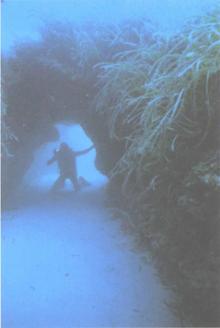 Underworld: The Mysterious Origins of Civilization
Underworld: The Mysterious Origins of Civilization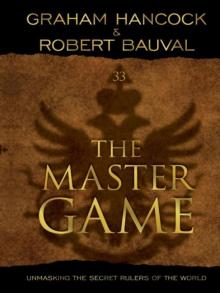 The Master Game: Unmasking the Secret Rulers of the World
The Master Game: Unmasking the Secret Rulers of the World America Before
America Before Entangled
Entangled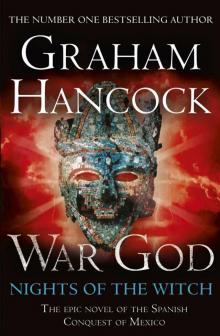 War God: Nights of the Witch
War God: Nights of the Witch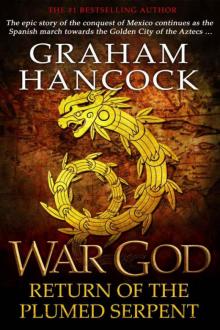 War God: Return of the Plumed Serpent
War God: Return of the Plumed Serpent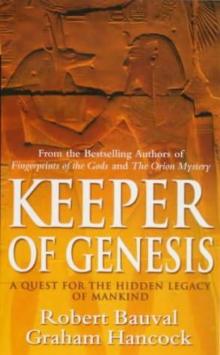 The Message of the Sphinx AKA Keeper of Genesis
The Message of the Sphinx AKA Keeper of Genesis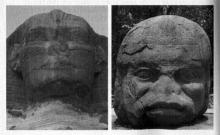 Fingerprints of the Gods
Fingerprints of the Gods The Sign and the Seal
The Sign and the Seal The Mars Mystery: The Secret Connection Between Earth and the Red Planet
The Mars Mystery: The Secret Connection Between Earth and the Red Planet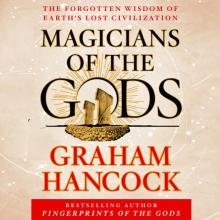 Magicians of the Gods: The Forgotten Wisdom of Earth's Lost Civilization
Magicians of the Gods: The Forgotten Wisdom of Earth's Lost Civilization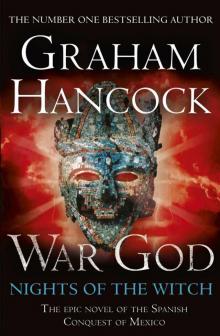 War God
War God Underworld
Underworld The Mars Mystery
The Mars Mystery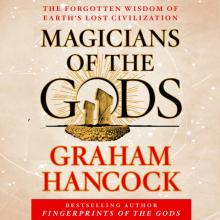 Magicians of the Gods
Magicians of the Gods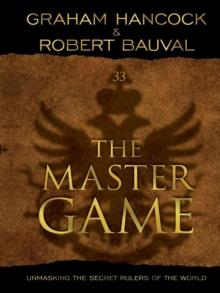 The Master Game
The Master Game